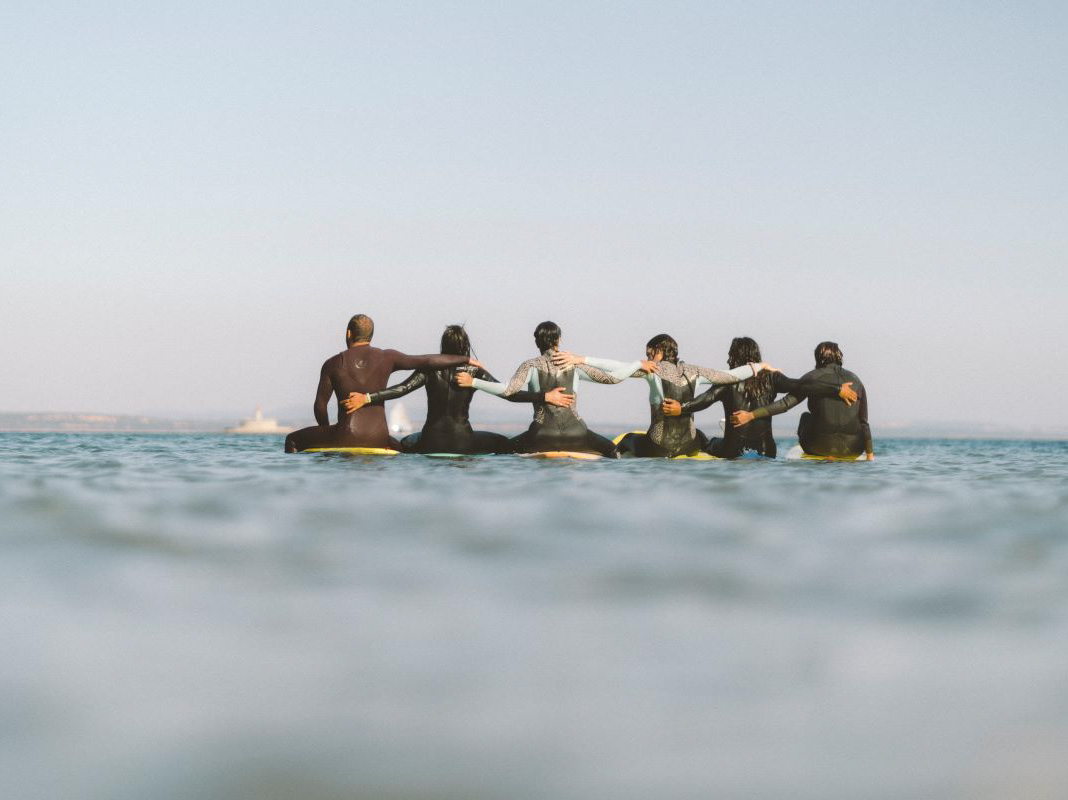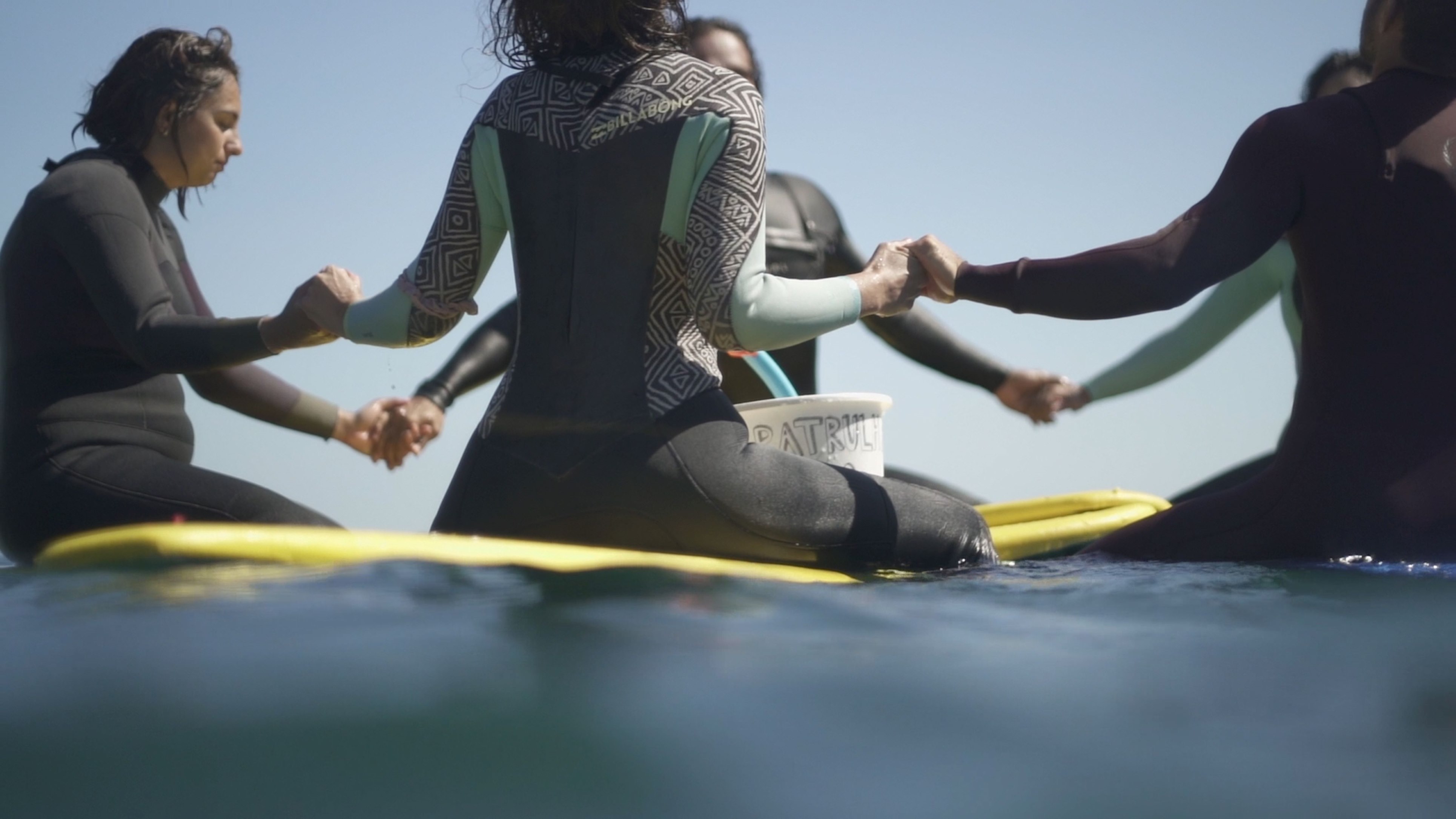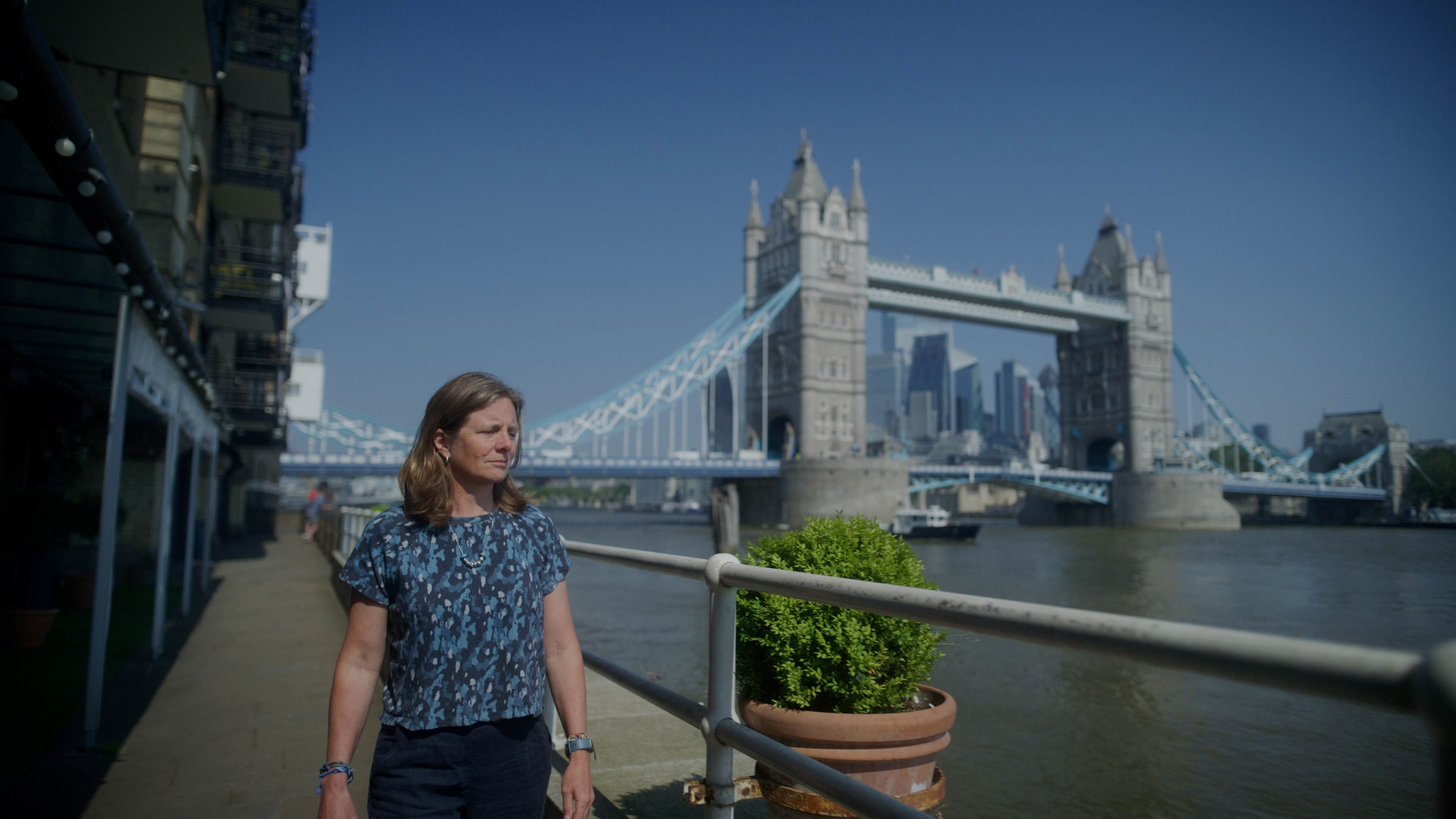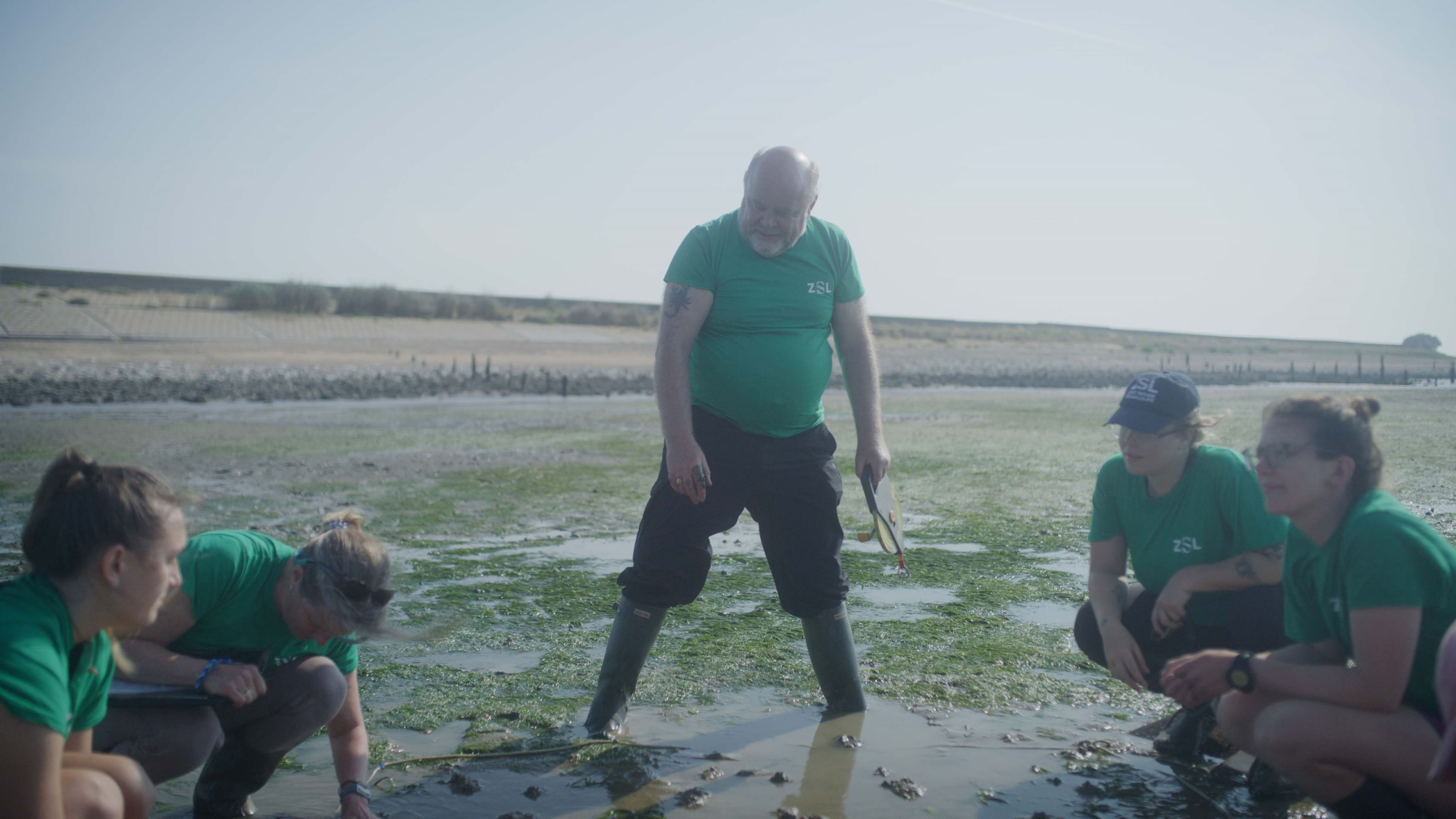Funding climate storytelling: Behind the scenes of BBC StoryWorks’ ’What the Ocean Reveals About Us’

On a hot summer’s day in June 2023, Luísa and Catarina were followed by a film crew from their suburban foster home to a surf therapeutic centre on Carcavelos beach near Lisbon, Portugal. Later that week, citizen scientist Kevin and marine biologist Heather spent two days with the same videographers on a boat in London observing a seagrass planting community project and talking about the recovery of the Thames.
The footage captured on that week – which happened to coincide with World Ocean Day – culminated in this six-minute film What the Ocean Reveals About Us. Produced by BBC StoryWorks for the Calouste Gulbenkian Foundation as part of The Climate And Us series, the film explores the climate-health nexus. It aims to highlight humanity’s dependence on and deep connection to the ocean, and why healing the ocean is so important.
For the Calouste Gulbenkian Foundation, these six minutes attempt to bottle over a decade of research and experience in supporting best practice ocean-climate communications.
Valuing the ocean
The ocean’s health is fundamental to our existence and the planet’s. Covering about seventy percent of Earth and providing half of the oxygen we breath, it supports life as we know it. The ocean plays a critical role in climate regulation, food provisioning and people’s livelihoods. Yet our ocean is not in a healthy state – pressures including climate change, pollution, habitat destruction and overfishing are causing ocean warming, acidification and marine biodiversity loss. Many working on ocean protection say that the health of the ocean is not sufficiently recognised in global climate policy-making and financing. SDG14, ‘Support life below water’, is regularly cited as the Sustainable Development Goal receiving the least amount of funding.
At the Calouste Gulbenkian Foundation, we are working to address this underinvestment and a broader lack of public awareness and care for the ocean. In 2013, research from our Valuing the Ocean programme showed that, underlying all the problems facing the ocean, a lack of knowledge about why the ocean matters was one of the biggest challenges facing ocean conservation. We know that with care comes responsibility – and this can increase the chance of society pressuring governments to improve conservation measures.
Our grant-funding has subsequently focused on building the capacity of NGOs to engage broad and new audiences on ocean issues – beyond the bubble of environmentalists and scientists – and demonstrate approaches that work.
Tools that have emerged through this work include Reframing the Ocean – guidance to help practitioners deepen public understanding of ocean health through framing and messaging techniques, and How to Talk About the Ocean so that People Will Listen – a pamphlet with three key recommendations for communicators. The recommendations are based on mixed-method research with over 8,000 members of the UK public.
Shifting the public narrative on ocean-climate action
Our current grant-making programme focuses on effective engagement on climate and ocean action. This includes funding initiatives and research that will help change the narrative on climate change and shift public opinion. Like many other climate funders, we have a strategic commitment to equity and our funding aims to diversify climate voices and reach underrepresented groups. This is not only the right thing to do, but we know that it leads to more engaged communities and stronger consensus for change. We have recently supported grassroots-focused groups including Climate Reframe, a network connecting people of colour communicators, and Pledgeball, an initiative mobilising climate action among football audiences. We provide core funding to organisations Climate Outreach and Communications INC working internationally to build the communications evidence base and the capacity of civil society to deploy what works best. We have recently launched an open call for organisations in Portugal working on climate public participation and engagement.
The emerging field of narrative change work is something we explored with UK-based funders at the 2022 Association of Charitable Foundations Conference, where we identified a need for funding of persistent, creative climate storytelling, reaching broad and new audiences.



When we were approached by BBC StoryWorks Commercial Productions this year to support ‘The Climate And Us’ series, we saw an opportunity to create something that was for a mass audience, but using science-based principles for climate communications. We were interested in how video content for BBC.com’s international channels could convey key messages about the ocean in the most engaging way.
BBC StoryWorks’ vision for the series aligned with ours. The production team wanted to highlight serious threats to the health of humanity and the planet; however, the series has avoided a negative framing. Instead, it encourages positivity by showcasing solutions, awe-inspiring scenes, and real stories of action where people’s work is leading to benefits for our health, economies and natural systems.
Behind the scenes
We convened partners we have worked with across the years and invited them to help us co-create the film with BBC StoryWorks’ expert producers. Through in-depth interviews with Catarina, Luísa, Heather and Kevin, the producers captured a variety of experiences and scenes which illustrate the diversity of humanity’s connection to the ocean. ‘What the Ocean Reveals About Us’ tells a simple story of connectedness – to the natural world, and to each other. As Catarina says when asked to describe her feelings about climate change – “caring for the sea and the planet is exactly the same as caring for yourself”.
Some techniques the film adopts include focusing on solutions, examples of positive action and messages of hope. It avoids the use of too many statistics – marine biologist Heather instead uses metaphors and gives everyday examples to explain the ocean’s complex role in systems such as regulating the water cycle. Her closing message reminds us that ocean protection is vitally important for future generations – a message that other climate message-testing has repeatedly shown works with many audiences. The messaging is subtle and was overseen by the expertise of BBC’s producers.
The opportunities funding climate communications
‘What the Ocean Reveals About Us’ is intentionally non-promotional. It does not advocate a specific policy goal, campaign message or scientific advancement. A benefit of climate content being funded by philanthropy, rather than by a business or campaigning organisation, is that we can focus on broader underlying messages that can help shape new stories and build public consensus for action. We have the privilege of looking at the whole system, taking risks and thinking long-term.
Public engagement is an area of increasing interest to climate funders – the latest ClimateWorks funding trends report indicated that public engagement was the most-funded strategic area in 2022. Work to build public will, mobilise groups and engage broad communities helps to create an enabling environment for policy and societal change. This recent report from Climate Outreach highlights key public engagement approaches for philanthropists to support.
However, despite increasing interest, climate narrative change still lacks investment, particularly outside the USA, and the need is huge. To counter the advertising budgets and lobbying efforts of fossil fuel companies – whose tactics to spread disinformation are well documented – civil society must work together to better align our communications efforts and ensure all groups of society are reached, reflected and involved in climate storytelling.
We hear from partners that to shift public opinion on climate, they need more communications capacity, opportunities to learn what has and hasn’t worked for others, more investment in strategy, and more non-branded or joint communications efforts.
At COP28, we repeatedly heard speakers quoting David Attenborough: “Saving our planet is now a communications challenge”. There is a huge opportunity for philanthropy to scale investment in climate storytelling, and for us to understand together what works and where we need to concentrate efforts.
This article was originally published on Philanthropy Europe Association.
Read more about the Calouste Gulbenkian Foundation’s Sustainability programme and our work changing the narrative on climate and ocean action.
With special thanks to those involved in creating the film, including BBC StoryWorks; Ema Shaw Evangelista, Catarina, Luísa and the Wave by Wave team; Heather Koldewey, Kevin and the team at ZSL Marine Nicky Hawkins and Heard; and Communications INC.
